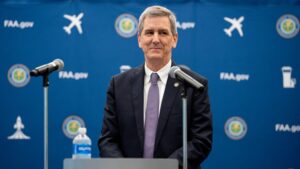FAA Leadership Transition: What’s Next for U.S. Aviation?
In a significant turn for the U.S. aviation landscape, Federal Aviation Administration (FAA) Administrator Mike Whitaker has announced he will step down on January 20, coinciding with the inauguration of President-elect Donald Trump. This decision adds yet another chapter to the ongoing saga of leadership instability within the FAA, particularly at a time when the agency is under unprecedented pressure to navigate the challenges surrounding both Boeing and the broader airline industry.
A Brief Yet Impactful Leadership Tenure
Whitaker’s tenure was marked by decisive actions aimed at restoring confidence in the safety and quality standards of the aviation sector. Shortly after his confirmation in October 2023, he imposed production limits on Boeing and increased scrutiny following an alarming incident involving a Boeing 737 Max in January, where a door-plug blowout nearly led to catastrophe. Under Whitaker’s leadership, the FAA sought to elevate the standards of safety, yet his departure leaves the agency once again without a permanent leader at a time fraught with challenges.
Mark House, currently serving as the FAA’s assistant administrator for finance and management, is set to step in as acting deputy administrator. However, the absence of a confirmed administrator raises questions about the FAA’s ability to provide the decisive leadership required during this critical period for U.S. aviation.
Navigating a Tumultuous Era
The aviation sector has seen a series of leadership changes at the FAA, especially in the wake of two high-profile crashes involving Boeing’s 737 Max aircraft and the subsequent global grounding of that fleet. These events were compounded by the impact of the COVID-19 pandemic, which fundamentally altered travel patterns and safety protocols. As operational challenges skyrocket with rising passenger demand, the FAA must also address ongoing safety concerns and operational inefficiencies within the airline industry.
Trump’s last nominee for the FAA role, Steve Dickson, a former Delta Air Lines captain, resigned mid-term in 2022, highlighting the tumultuous nature of this leadership pipeline. As Whitaker aptly stated, "You have seen leadership come and go — and through every transition you have kept air travel steady and safe." His words echo the resilience of the industry amidst a backdrop of leadership instability.
The Road Ahead for the Incoming FAA Nominee
As Trump prepares to nominate a new FAA administrator, the incoming leader will face a myriad of challenges. Among these are ongoing oversight of Boeing, whose negative publicity and operational issues have raised the eyebrows of regulators and passengers alike. Staffing shortages, particularly within air traffic control, have caused significant congestion in major airports, a point that has not gone unnoticed by industry executives who claim that operational bottlenecks are becoming a critical concern.
Moreover, the FAA’s role in regulating the burgeoning space industry has come under scrutiny. High-profile players like Elon Musk’s SpaceX and Jeff Bezos’ Blue Origin are clamoring for a more streamlined regulatory framework to facilitate rocket launches. Musk’s recent threats to sue the FAA over perceived regulatory overreach underscore the tension between innovation and regulation in the aerospace sector.
What This Means for Investors and Enthusiasts
At Extreme Investor Network, we believe that staying informed about these developments is crucial for making strategic investment decisions. The aviation industry, intertwined with government policy and regulation, directly impacts market stability. Investors should keep a close eye on the upcoming nomination and the priorities of the new FAA administrator, as shifts in leadership could lead to significant changes in regulations that affect not only Boeing but also the broader airline market.
For aviation enthusiasts and industry stakeholders, this transition could signal upcoming opportunities and challenges, particularly as the agency grapples with modernization efforts and enhances safety protocols.
In conclusion, as we approach the end of an era with Whitaker’s departure, it’s essential to remain engaged with the evolving landscape of U.S. aviation. We’ll continue to provide insights and updates as this story unfolds, ensuring you are always ahead of the curve with the information you need to navigate your investments effectively.

